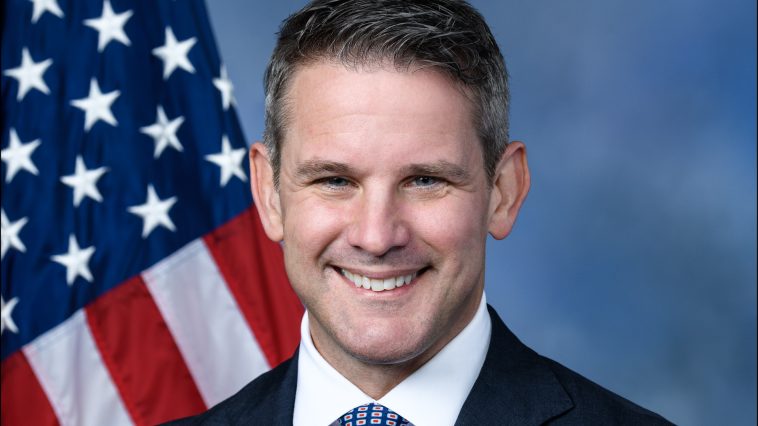LISTEN HERE:
Arizona Congressman Adam Kinzinger recently criticized Yevgeny Prigozhin’s call for an armed rebellion in Russia. Kinzinger described Prigozhin’s comments as a “massive blow” to lawmakers who have been drawn to Russian President Vladimir Putin’s propaganda.
Speaking on CNN, Kinzinger expressed his concerns about former Fox News host Tucker Carlson’s admiration for Putin after Russia’s poor handling of the Ukraine conflict.
Kaitlan Collins interviewed Kinzinger on the issue, where Kinzinger said that “It’s a massive blow to the people here in the United States like, say, Tucker Carlson, who have been parroting Putin talking points to have Prigozhin – the head of Wagner himself – say those have been [Putin’s] lies.”
Kinzinger’s appearances on CNN led to a discussion of what could happen in Russia following the call to rebellion, with Kinzinger anticipating some instability even if the coup is unsuccessful.
Russia’s Defense Ministry denied Prigozhin’s claims regarding their rocket strike, and the Russian Federal Security Services’ National Anti-Terrorism Committee has launched an investigation into Prigozhin
. AP reports that Wagner Group troops have entered Rostov, Russia’s fourth-largest city, while Kremlin forces have increased security in Moscow. Kinzinger also criticized members of Congress and the Senate who have been “parroting Putin’s lies” in connection with the conflict in Ukraine.
The rhetoric of American politicians and media personalities towards Putin has been troubling. Despite evidence to the contrary, these individuals insist on painting Putin as an honorable individual. They eagerly parrot his lies about the conflict in Ukraine and the role of NATO in the conflict. Congressman Kinzinger’s criticism of Carlson ought to serve as a wakeup call to those who have long bought into Putin’s propaganda.
The occupation of Rostov is cause for concern. If Wagner Group troops have indeed moved into the city, it represents a significant escalation of the conflict. Rostov is a major cultural and economic hub for Southern Russia, and the potential loss of control of the city would be a significant blow to the Putin regime.
Prigozhin’s call for rebellion is a clear indication of the increasing instability in Russia’s political landscape. Putin has faced criticism from many in Russia for his handling of the Ukraine conflict, and it seems that this criticism is beginning to boil over. The move by the anti-terrorism committee to investigate Prigozhin is a positive development, but it remains to be seen how effective this investigation will be.
Congressman Kinzinger is one of the few voices in Washington who has consistently spoken out against Putin’s propaganda. His outspoken criticism of Carlson and other right-wing lawmakers who have bought into Putin’s lies is to be commended. The fact remains, however, that Putin’s propaganda has taken hold among a sizable portion of the American population.
We must work to counter Putin’s propaganda. The United States must take a stronger stance against the Putin regime and its efforts to destabilize the region. At the same time, we must work to better understand the complex political landscape of Russia and its many factions.
Putin’s actions in Ukraine are a serious cause for concern. The invasion of Ukraine and the resulting conflict are clear violations of international law, and represent a significant threat to regional stability. Putin’s continued aggression threatens to destabilize the entire region, and it is imperative that the international community work together to address this threat.
The United States must be a leader in this effort. We must work with our allies in Europe and elsewhere to apply pressure on Putin and his regime. We must also be prepared to defend our interests and those of our allies should the situation in Ukraine continue to deteriorate.
The situation in Ukraine is complex and multifaceted. It is important that we take a nuanced approach to the conflict, and work to better understand the motivations of each side. At the same time, however, we must be firm in our support for the territorial integrity of Ukraine.
Congressman Kinzinger’s criticism of Carlson is not simply a political disagreement. Carlson’s repeated attempts to downplay Putin’s aggression represent a real threat to US security interests. It is imperative that we take these threats seriously and work to counter them.
Ultimately, the United States must be willing to take a strong stand against Putin’s aggression. We must be prepared to use all of the tools at our disposal to prevent further destabilization in the region. This will require a coordinated effort with our allies and partners around the world.
As Americans, we must remain vigilant against Putin’s propaganda. His lies seek to undermine not just our democracy, but the democratic ideals that underpin our society. We must stand up to these lies and defend the truth. Only then can we hope to confront and defeat the challenges we face.
Congressman Kinzinger’s criticism of Tucker Carlson and other right-wing lawmakers who have bought into Putin’s propaganda is a welcome development. It is important that we continue to hold our political leaders and media personalities accountable for their words and actions. It is through this kind of vigilance that we can hope to build a more just and equitable society, both domestically and abroad.
We cannot allow Putin’s propaganda to go unchecked. We must be prepared to take a strong stand against Russian aggression and work to promote our own democratic values both at home and abroad. It is only through this kind of effort that we can hope to build a better world for ourselves and for future generations.


